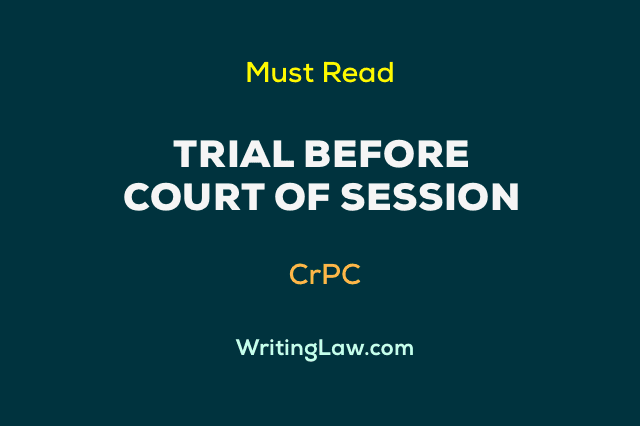
The word ‘trial’ is undefined in the Criminal Procedure Code. The trial can be defined as a type of inquiry with the object to determine the guilt or innocence of the accused person. Warrant cases are triable either by the Court of Session or Magistrate, whereas the summon cases are triable only by a Magistrate.
Please note that the Court of Session doesn’t take direct cognizance of the cases, but the cases are committed to the Court of Session under section 209 of the Criminal Procedure Code by the Magistrate if it is exclusively triable by Session court.
It is to be noted that Session Court tries those offences which are punishable with more than seven years, life imprisonment, or death. Section 199(2) of the Criminal Procedure Court provides with the exception that in case of defamation of high dignitary or public official, a written complaint can be filed by the Public Prosecutor, and the Court of Session can take direct cognizance here.
Procedure for Regular Trial
According to section 225 of the Criminal Procedure Code, the trial before the Court of Session will be conducted by the Public Prosecutor.
- Section 226: Opening Case for the Prosecution
- Section 227: Discharge
- Section 228: Framing of Charges
- Section 229: Conviction on Plea of Guilty
- Section 230: Date for Prosecution Evidence
- Section 231: Evidence for Prosecution
- Section 232: Acquittal
- Section 233: Entering Upon the Defence
- Section 234: Arguments
- Section 235: Judgement
- Section 236: Previous Conviction
Section 226: Opening Case for the Prosecution
When the case is committed to the Session Court, and the accused appears before the Court of Session, the case will be opened for prosecution by the Public Prosecutor by describing the charge and stating the evidence.
Section 227: Discharge
Discharge is a mere suspension of the trial. After considering the evidence, if the judge considers there aren’t sufficient grounds for proceeding against the accused, he’ll discharge the accused after recording the reason. It will be a speaking order. According to section 319 of the Criminal Procedure Code, Session Court has the power to add any person against whom there appears sufficient evidence of his involvement in the case and direct him to be tried with other accused.
Section 228: Framing of Charges
When the case is not exclusively triable by the Session Court, the judge may or may not frame the charges and would transfer the case to the Chief Judicial Magistrate.
When the case is exclusively triable by the Session Court, the judge shall frame the charges. The charge then shall be read and explained to the accused. The accused shall then be asked if he pleads guilty or claims to be tried.
Section 229: Conviction on Plea of Guilty
It is the judge’s discretionary power. If the accused pleads guilty, his plea will be taken on record, and the judge, upon his discretion, shall convict the accused or fix the date for prosecution evidence under section 230 of the Criminal Procedure Code.
Section 230: Date for Prosecution Evidence
Suppose the accused claims to be tried or does not pleads or refuses to plead or is not convicted under section 229 of the Criminal Procedure Code. In that case, the date will be fixed for examination of the witness or issue of process to call a witness or for production of any object or thing.
Section 231: Evidence for Prosecution
On the date so fixed, the judge shall record the evidence. The judge, upon his discretion, shall postpone the cross-examination of the witness until other witnesses are examined or recall any other witness for cross-examination.
Section 232: Acquittal
The court can acquit the accused if there is no satisfactory or conclusive evidence that he committed any offence.
Section 233: Entering Upon the Defence
In case the accused is not acquitted, he shall enter upon his defence and adduce his evidence. He may file his written statement or application for issue of any process. But such application will not be accepted if it is with the intent to cause delay or vexatious in nature.
Vexatious means ‘disorderly’ or ‘instituted without sufficient grounds and serving only to annoy the defendant’.
Section 234: Arguments
When the evidence from the defence is concluded, the prosecution shall sum up the case, and then the defence is entitled to reply.
Section 235: Judgement
After hearing the arguments, the judge shall deliver the judgement where he shall either acquit or convict the accused. If the accused is to be convicted, there shall be a hearing on the question of sentence.
In Allauddin Mian vs State of Bihar, it was held that hearing on the question of sentence is mandatory.
Section 236: Previous Conviction
Where a previous conviction is charged under section 211(7) of the Criminal Procedure Code, and the accused refuses to admit it, the judge may, after conviction, take evidence regarding that previous conviction.
- What Is a Foreign Judgement and When It’s Not Binding in India - 26th July 2022
- What Are Second Appeals Under Civil Law - 23rd June 2022
- Civil Appeal as Per the Civil Procedure Code - 12th June 2022







